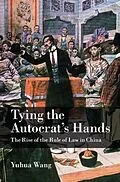Under what conditions would authoritarian rulers be interested in the rule of law? What type of rule of law exists in authoritarian regimes? How do authoritarian rulers promote the rule of law without threatening their grip on power? Tying the Autocrat's Hands answers these questions by examining legal reforms in China. Yuhua Wang develops a demand-side theory arguing that authoritarian rulers will respect the rule of law when they need the cooperation of organized interest groups that control valuable and mobile assets but are not politically connected. He also defines the rule of law that exists in authoritarian regimes as a partial form of the rule of law, in which judicial fairness is respected in the commercial realm but not in the political realm. Tying the Autocrat's Hands demonstrates that the rule of law is better enforced in regions with a large number of foreign investors but less so in regions heavily invested in by Chinese investors.
Zusammenfassung
Tying the Autocrat''s Hands provides a comprehensive, empirical evaluation of legal reforms in contemporary China.
